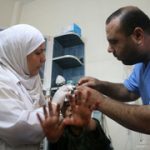In two weeks, President Obama will chair a session of the UN Security Council. This timing is especially relevant given his recent speech on the self-declared Islamic State (IS), also called ISIS or ISIL, and the actions that the United States will take against the group. He pledged to use the UN session as a method to mobilize the international community around what “…the United States will do with our friends and allies to degrade and ultimately destroy the terrorist group known as ISIL.”
IS is a terrorist organization perpetrating what amounts to mass atrocities, war crimes, and – some argue – crimes against humanity, genocide, and ethnic cleansing.
They have committed grave breaches of international law including the laws of war, which govern conduct during hostilities. IS, along with others committing similar crimes, must be prevented from engaging in additional abuses and be held accountable for these crimes.
It is, however, important to keep in mind where these abuses are happening.
On the same turf that IS operates – lest we forget – other actors are committing mass atrocities, while enjoying full impunity.
Since the onset of the conflict in Syria, many international human rights organizations, including Physicians for Human Rights (PHR), have documented human rights abuses perpetrated by multiple parties to the conflict, including the Syrian regime. As the head of state in Syria, Bashar al-Assad is ultimately responsible for the vicious methods his regime has employed to crush dissent, including rape, murder, the destruction of civilian infrastructure far from military targets, and the use of enforced disappearance.
These are just some of the tools that Assad has used in his commission of large-scale repression. Countless people perceived as anti-government have been targeted by his forces, taken, and held incommunicado at secret detention facilities. Many suffer torture and other forms of ill-treatment and are oftentimes killed. This represents just one example of how the conflict has left families forever broken, facing profound loss and significant psychological trauma.
In his plan to take down IS, President Obama did not mention how the United States and other countries plan to concurrently address the amounting crimes being perpetrated by the Syrian state and other armed opposition groups.
The story of “Dr. B” and many other doctors working in Syria tell a very grave tale.
Alarmingly absent from President Obama’s address was acknowledgment of the immense challenges facing medical professionals attempting to treat victims of the conflicts in Syria and Iraq, including victims of IS’s horrific actions. PHR has been documenting the systematic and widespread attacks against health care in Syria, which can be seen in this interactive map.
Medical professionals, in accordance with the principle of medical neutrality, must exercise non-discrimination in their treatment of patients. This means that anyone – regardless of their race, religion, gender, sexual orientation, gender identity, or affiliation with any government or non-state actor – receives treatment.
Doctors have personally told PHR about being targeted while treating patients in Syria. Dr. B explained to PHR that he and his colleagues live in constant fear of attack, always anxious that another rocket will fall and demolish their hospital and all those inside. Dr. Abo Mayar, another doctor working in Syria said: “I am not afraid of death – but I am afraid I will lose my hands, and all my work is within my hands.”
We should all be concerned that the international community, in their effort to eliminate IS, may fail to address the crimes perpetrated by all parties to the conflicts in Syria, Iraq, and elsewhere. The international community must protect those risking their lives to provide treatment for all.
President Obama has another opportunity to address these issues at the upcoming UN Security Council session. If he doesn’t, I strongly urge other members of the Security Council to raise these issues at that time.
The international community must not exercise discrimination in their obligations to prevent and respond to the human rights abuses being committed in these countries, and perpetrators must be held accountable for the commission of such crimes. The international community must also specifically ensure that any operation against IS allows health professionals caring for the injured to safely do their job.

